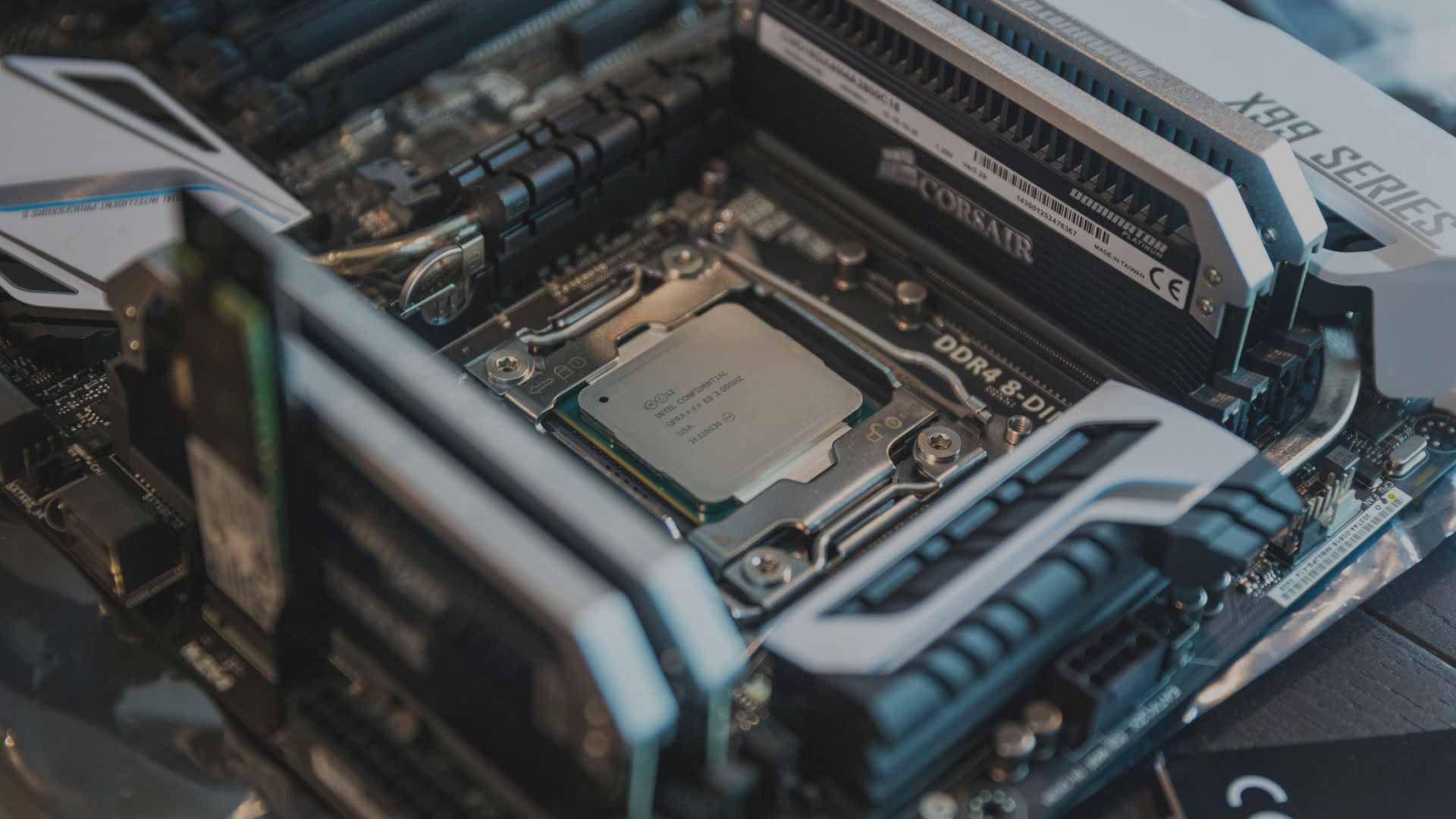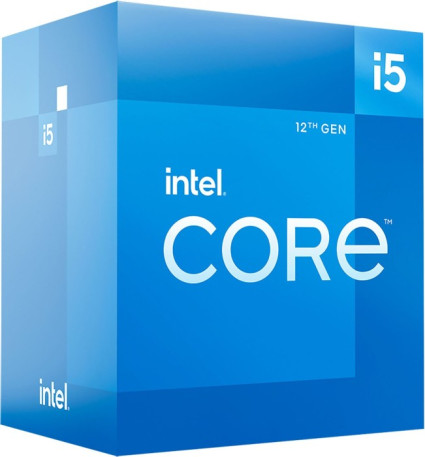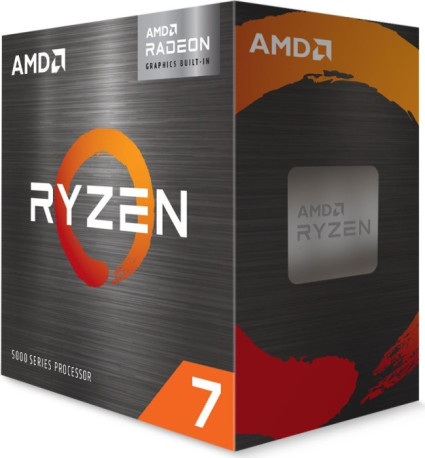
Intel Core i5-12400 vs. AMD Ryzen 7 5700G
In diesem Vergleich von Intel Core i5-12400 versus AMD Ryzen 7 5700G vergleichen wir die technischen Daten der beiden GPUs. Welche Grafikkarte ist schneller? Hier gibt es FPS & Benchmarks in Gaming und Anwendungen. Außerdem Daten zu Verbrauch, Effizienz (FPS pro Watt) und Preis-Leistung (FPS pro Euro).

Allgemeine Informationen
| Günstigster Preis |
|
|
| Serie | Intel Core i-12000 | Ryzen 5000 |
| Chip-Architektur | Golden Cove | Zen 3 |
| Codename | Alder Lake-S | Cezanne |
| Produktname | Intel Core i5-12400 | AMD Ryzen 7 5700G |
Spezifikationen
Die Anzahl der Rechenkerne, die maximale Taktrate und die Größe des Cache können sich auf die Leistung in Spielen und Anwendungen auswirken. Mit 6 Kernen bietet der Intel Core i5-12400 deutlich weniger Kerne als der AMD Ryzen 7 5700G mit 8 Rechenkernen. Der maximale Takt liegt beim Intel Core i5-12400 mit 4.40 GHz etwas niedriger als beim AMD Ryzen 7 5700G mit 4.60 GHz. Der Cache ist beim Intel Core i5-12400 mit 7.5 MB L2-Cache + 18 MB L3-Cache zu 4 MB L2-Cache + 16 MB L3-Cache deutlich höher als beim AMD Ryzen 7 5700G.
| Kerne (Gesamt) | 6 | 8 |
| Anzahl P-Cores | 6C | 8C |
| Anzahl E-Cores | - | - |
| Basis-Takt | 2.50 GHz | 3.80 GHz |
| Takt P-Cores | 2.50 GHz | 3.80 GHz |
| Takt E-Cores | - | - |
| Turbo-Takt | 4.40 GHz | 4.60 GHz |
| Turbo P-Cores | 4.40 GHz | 4.60 GHz |
| Turbo E-Cores | - | - |
| Gesamter L2-Cache | 7.5 MB | 4 MB |
| Gesamter L3-Cache | 18 MB | 16 MB |
| Fertigung | Intel 7 | TSMC 7 nm |
| Rechenleistung | - | - |
| Leistungsaufnahme (TDP) | 65W (Processor Base Power) 117W (Maximum Turbo Power) |
65W 45W cTDP-down |
Mainboard-Kompatibilität
Während der Intel Core i5-12400 den Intel 1700 Sockel nutzt, ist der AMD Ryzen 7 5700G mit Mainboards für den Sockel AMD AM4 kompatibel. Die genaue Chipsatz-Eignung und die unterstützten PCIe-Lanes können Sie der Tabelle entnehmen.
| Sockel | Intel 1700 | AMD AM4 |
| Chipsatz-Eignung | B660, B760, H610, H610E, H670, H770, Q670, Q670E, R680E, W680, Z690, Z790 | A520, B550, X300 (AM4), X570 (modellabhängig: A320, B350, B450, X370, X470) |
| PCIe-3.0-Lanes | - | 24x [16+4+4] |
| PCIe-4.0-Lanes | 4x | - |
| PCIe-5.0-Lanes | 16x | - |
RAM-Kompatibilität
Während Sie beim Intel Core i5-12400 bis zu 128 GB vom Typ DDR4/DDR5 im Dual Channel verbauen können, unterstützt der AMD Ryzen 7 5700G bis zu 128 GB DDR4 Arbeitsspeicher.
| Speicher-Controller | DDR4/DDR5 | DDR4 |
| Anzahl Speicherkanäle | Dual Channel | Dual Channel |
| max. Speichermenge | 128 GB | 128 GB |
| ECC-Unterstützung | - | - |
Grafik
| iGPU | ✓ | ✓ |
| iGPU-Modell | Intel UHD Graphics 730 | AMD Radeon Graphics |
| iGPU-Takt | 0,30-1,45GHz | 2,00GHz |
| iGPU-Einheiten | 1.5Xe/24EU/192SP | 8CU/512SP |
| iGPU-Rechenleistung | 0.58 TFLOPS (FP32) | 2.05 TFLOPS (FP32) |
| iGPU-Architektur | Xe-LP / Gen 12.2, Codename "Alder Lake GT1" | GCN 5.1, Codename "Vega" |
| iGPU-Interface | DP 1.4a (7680x4320@60Hz), eDP 1.4b (5120x3200@120Hz), HDMI 2.1 (4096x2160@60Hz) | DP 1.4 (3840x2160@60Hz), HDMI 2.0b (3840x2160@60Hz) |
| iGPU-Funktionen | 4x Display Support, 1x Codec Engine / Video Decode Box, Intel Clear Video HD, Intel Quick Sync Video, AV1 decode, H.265 encode/decode, VP9 encode/decode, HDCP 2.3, DirectX 12, OpenGL 4.5, OpenCL 3.0, Vulkan 1.0 | 4x Display Support, AMD Eyefinity, AMD FreeSync 2, H.265 encode/decode, VP9 decode, DirectX 12.1, OpenGL 4.5, Vulkan 1.0, max. 16GB iGPU-Speicher |
Sonstiges
| Freier Multiplikator | - | ✓ |
| Stepping | C0/H0, Spec Code: SRL4V/SRL5Y | CZ-A1 |
| Heatspreader-Kontaktmittel | Metall/verlötet | Metall/verlötet |
| Temparatur max. | 100°C (Tjunction) | 95°C (Tjmax) |
| Fernwartung | - | - |
| Einführung | 2022/Q1 (4.1.2022) | 2021/Q2 (13.4.2021) |
| Herstellergarantie | 3 Jahre bei Intel® Boxed-Prozessoren (Info DE/Info EN) | 3 Jahre bei AMD® Boxed-Prozessoren (Info EN) |
CPU-Funktionen
| AES-NI | ✓ | ✓ |
| AVX | ✓ | ✓ |
| AVX2 | ✓ | ✓ |
| Boot Guard | ✓ | - |
| CET | ✓ | - |
| DL Boost | ✓ | - |
| EIST | ✓ | - |
| GNA 3.0 | ✓ | - |
| Idle States | ✓ | - |
| Instruction Set | ✓ | - |
| ISM | ✓ | - |
| MBEC | ✓ | - |
| Optane Memory Support | ✓ | - |
| OS Guard | ✓ | - |
| Secure Key | ✓ | - |
| Speed Shift | ✓ | - |
| SSE4.1 | ✓ | ✓ |
| SSE4.2 | ✓ | ✓ |
| Thermal Monitoring | ✓ | - |
| VMD | ✓ | - |
| VT-d | ✓ | - |
| VT-x | ✓ | - |
| VT-x EPT | ✓ | - |
| XD Bit | ✓ | - |
Spiele

- AMD Ryzen 7 5700GAVG99.91 %1%103.07 %
- Intel Core i5-12400AVG100.00 %1%100.00 %

- Intel Core i5-12400AVG113.4 FPS1%79.5 FPS
- AMD Ryzen 7 5700GAVG179.9 FPS1%136.9 FPS

- Intel Core i5-12400AVG389.4 FPS1%227.7 FPS
- AMD Ryzen 7 5700GAVG373.3 FPS1%226.5 FPS

- Intel Core i5-12400AVG119 FPS1%78 FPS
- AMD Ryzen 7 5700GAVG130 FPS1%81.5 FPS

- Intel Core i5-12400AVG166 FPS1%111.3 FPS
- AMD Ryzen 7 5700GAVG146.5 FPS1%105.4 FPS

- Intel Core i5-12400AVG118.2 FPS1%85.3 FPS
- AMD Ryzen 7 5700GAVG98.5 FPS1%69.1 FPS

- Intel Core i5-12400AVG184 FPS1%114.1 FPS
- AMD Ryzen 7 5700GAVG176.1 FPS1%111.4 FPS

- Intel Core i5-12400AVG66.5 FPS1%50.5 FPS
- AMD Ryzen 7 5700GAVG57.5 FPS1%42.6 FPS

- Intel Core i5-12400AVG191.2 FPS1%108.8 FPS
- AMD Ryzen 7 5700GAVG156.4 FPS1%98.7 FPS

- AMD Ryzen 7 5700GAVG1.14 FPSIntel Core i5-12400AVG1.20 FPS

- AMD Ryzen 7 5700GAVG4.03 FPSIntel Core i5-12400AVG3.09 FPS
Produktivität
Produktivität

- AMD Ryzen 7 5700GAVG111.98 %Intel Core i5-12400AVG100.00 %

- AMD Ryzen 7 5700GPKT96826 PunkteIntel Core i5-12400PKT63779 Punkte

- AMD Ryzen 7 5700GPKT1062 PunkteIntel Core i5-12400PKT1028 Punkte

- AMD Ryzen 7 5700GPKT699 PunkteIntel Core i5-12400PKT605 Punkte

- AMD Ryzen 7 5700GSEK396 SekundenIntel Core i5-12400SEK499 Sekunden

- AMD Ryzen 7 5700GPKT787 PunkteIntel Core i5-12400PKT616 Punkte

- AMD Ryzen 7 5700GPKT2247 PunkteIntel Core i5-12400PKT2247 Punkte

- AMD Ryzen 7 5700GPKT9831 PunkteIntel Core i5-12400PKT10438 Punkte

- AMD Ryzen 7 5700GSEK103 SekundenIntel Core i5-12400SEK121 Sekunden




